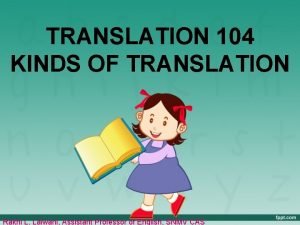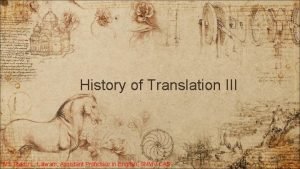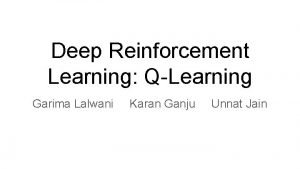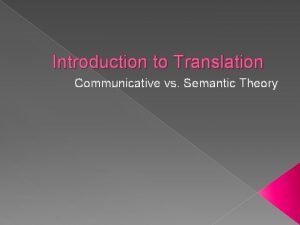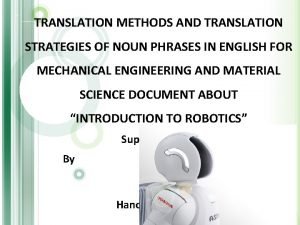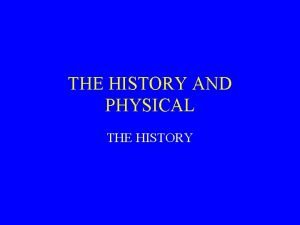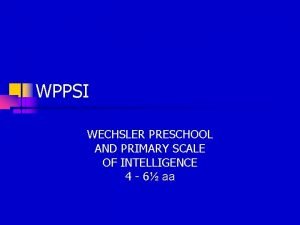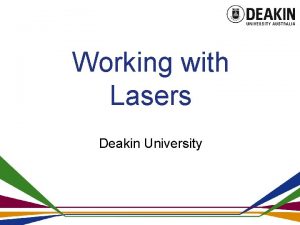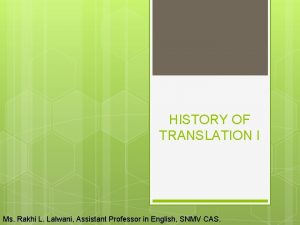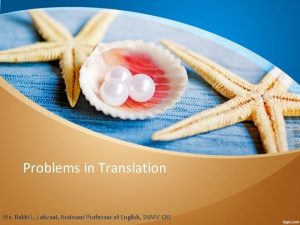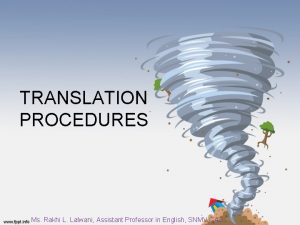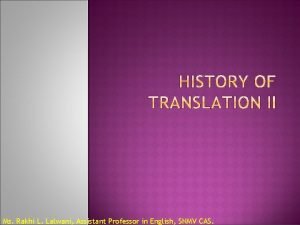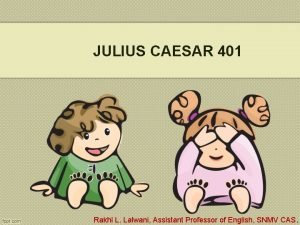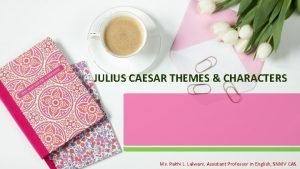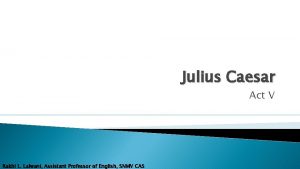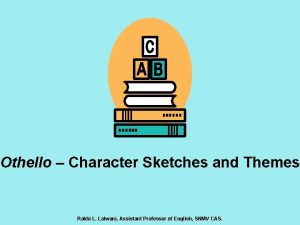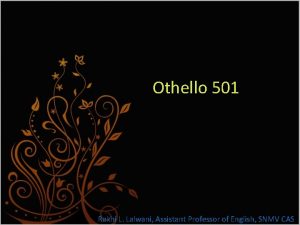History of Translation III Ms Rakhi L Lalwani













- Slides: 13

History of Translation III Ms. Rakhi L. Lalwani, Assistant Professor in English, SNMV CAS.

THE EIGHTEENTH CENTURY • • • Beyond the debate of overfaithfulness and looseness. Focus shifted to the moral duty of the translator to the reader. Expose the essential ‘spirit’ of the text. Led to re-writings and restructuring based on contemporary structures of language. Dr. Johnson explained that if addition adds to the elegance of a text, it is acceptable, ensuring that nothing is lost. • “the purpose of a writer is to be read. ” • Provided the example of Pope who wrote for his own age and time. • Changing concept of “originality” – translation on translator’s terms. • Translator as painter or imitator with moral duty to two sides. • Goethe – three phases in translation: 1. Acquaintance with foreign language on own terms. 2. appropriation through substitution and reproduction – sense absorbed and reproduced based on translator’s terms. 3. Aims for perfect identity between the SL text and the TL text - creation of a new ‘manner’ which fuses the uniqueness of the original with a new form and structure. 2 CAS. Ms. Rakhi L. Lalwani, Assistant Professor in English, SNMV

• Problem of untranslatability. • In 1791, Alexander Fraser Tytler published a volume entitled The Principles of Translation, the first systematic study in English of the translation processes. • Three principles: (1) The translation should give a complete transcript of the idea of the original work. (2) The style and manner of writing should be of the same character with that of the original. (3) The translation should have all the ease of the original composition. • Paraphrase leads to loose translations. • Part of translator’s duty is to clarify obscurities. • Translator is like a painter – cannot use same colours, but should bring the same “force and effect. ” • Concerned with problem of recreating an essential spirit, soul or nature of the work of art. 3 CAS. Ms. Rakhi L. Lalwani, Assistant Professor in English, SNMV

Romanticism Ms. Rakhi L. Lalwani, Assistant Professor in English, SNMV CAS.

• Reaction against rationalism and formal harmony • French Revolution of 1789. • Rejection of rationalism. • stress on the vitalist function of the imagination, on the individual poet’s world-vision • Affirmation of individualism and creative force. • Coleridge’s Fancy and Imagination - Imagination is the supreme creative and organic power, as opposed to the lifeless mechanism of Fancy. • Question of how to define translation—as a creative or as a mechanical enterprise. • A. W. Schlegel – All acts of speaking and writing – translation as it involves decoding. • Friedrich Schlegel (1772– 1829) - category of thought rather than as an activity connecte only with language or literature. • Poet – process of repeating - ‘the Divine Body in Every Man’ • Shift of interest away from the actual processes of translation – focus to impact of translation in TL. 5 CAS. Ms. Rakhi L. Lalwani, Assistant Professor in English, SNMV

• Two lines – Translator as creative genius – enriching Literature and Translator as a mechanical writer – making the text known. • The problem of meaning – read between the words of the original and hence reproduce the text behind- thetext; “Mallarmé’s text of silence and spaces • Shelley saw translation as an activity with a lower status, as a ‘way of filling in the gaps between inspirations’ • Shelley appears to shift from translating works admired for their ideas to translating works admired for their literary graces. • Shift of emphasis away from the formal processes of translation, the notion of untranslatability would lead on to the exaggerated emphasis on technical accuracy and resulting pedantry of later nineteenth-century translating. (1) the use of literal translation, concentrating on the immediate language of the message; or (2) the use of an artificial language somewhere in between the SL text where the special feeling of the original may be conveyed through strangeness. 6 CAS. Ms. Rakhi L. Lalwani, Assistant Professor in English, SNMV

POST-ROMANTICISM 7 CAS. Ms. Rakhi L. Lalwani, Assistant Professor in English, SNMV

Friedrich Schleiermacher (1768– 1834) - creation of a separate sub-language for use in translated literature only Dante Gabriel Rossetti (1828– 82) - translator’s subservience to the forms and language of the original. William Morris (1834– 96) - deliberately, consciously archaic, full of such peculiarities of language that they are difficult to read and often obscure. 8 CAS. Ms. Rakhi L. Lalwani, Assistant Professor in English, SNMV

THE VICTORIANS • • • Remoteness of the original in time and place. Thomas Carlyle (1795– 1881) – Germanic structures. Dante Gabriel Rossetti (1828– 82) – endow with new beauty. One hand – original is respected. On the other hand it is seen as property. Reject the idea of universal literacy by archaizing. Matthew Arnold – refer text - focus on the SL text primarily. élitist concept of culture and education – translation no longer a means to enrich their culture. Assisted in devaluation of the process of translation. H. W. Longfellow - translator is relegated to the position of a technician, neither poet nor commentator, with a clearly defined but severely limited task. Edward Fitzgerald – TL is more important – low status of SL text – patronising attitude. Eugene Nida – ‘Spirit of exclusivism’ – offering exotic wares to discerning few. Ms. Rakhi L. Lalwani, Assistant Professor in English, SNMV CAS.

FROM THE VICTORIANS TO THE WORLD WAR (1) Translation as a scholar’s activity, where the pre-eminence of the SL text is assumed de facto over any TL version. (2) Translation as a means of encouraging the intelligent reader to return to the SL original. (3) Translation as a means of helping the TL reader become the equal of what Schleiermacher called the better reader of the original, through a deliberately contrived foreignness in the TL text. (4) Translation as a means whereby the individual translator who sees himself like Aladdin in the enchanted vaults (Rossetti’s imaginative image) offers his own pragmatic choice to the TL reader. (5) Translation as a means through which the translator seeks to upgrade the status of the SL text because it is perceived as being on a lower cultural level. 10 Ms. Rakhi L. Lalwani, Assistant Professor in English, SNMV CAS.

THE TWENTIETH CENTURY Discussions on the problem of evaluation without a theoretical base. First half of 20 th Century – Wasteland of Translation? Famous Translator – Ezra Pound. Hilaire Belloc’s – “On Translation. ” – practical problems of translation. James Mc. Farlane’s “Modes of Translation” – interdisciplinary view focusing on study of translation. 11 Ms. Rakhi L. Lalwani, Assistant Professor in English, SNMV CAS.

1970 - PRESENT • Two ideologies – Intercultural Transaction and Functions and Aims of the text. • Skopos Theory – derives from Greek word meaning ‘purpose’ – coined by Katharina Reiss and Hans Vermeer – also known as Functionalist Theory. • Pragmatic – focuses on the purpose the text should serve. • Reconfiguration of a text – lack of constraints to follow structures – larger viewpoint – attention shifts from SL to TL. • Translation and Power – Even Zohar – Translation fluctuates based on growth of Literature – shapes literary and cultural history. • 1990 - Andre Lefevere – cultural turn – context, history, convention – discrepancy in reception in SL and TL. • Questions unequal relationships between power and between languages and cultures. • Translators create knowledge and shape culture. • Translation and the Internet – increased speed of communication – Machine Translation – Computer Translation – Audio Visual Translation. • Media Translation – new field? 12 CAS. Ms. Rakhi L. Lalwani, Assistant Professor in English, SNMV

THANK YOU Ms. Rakhi L. Lalwani, Assistant Professor in English, SNMV CAS.
